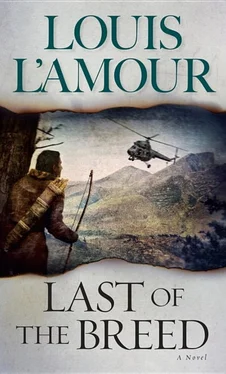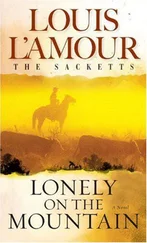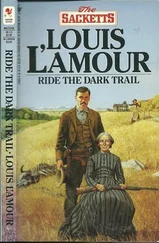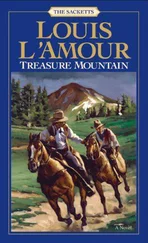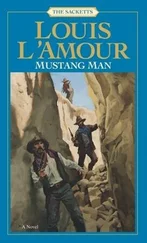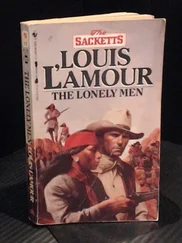Louis L'Amour - Last of the Breed
Здесь есть возможность читать онлайн «Louis L'Amour - Last of the Breed» весь текст электронной книги совершенно бесплатно (целиком полную версию без сокращений). В некоторых случаях можно слушать аудио, скачать через торрент в формате fb2 и присутствует краткое содержание. Город: New York, Год выпуска: 2010, ISBN: 2010, Издательство: Random House Publishing Group, Жанр: Триллер, Историческая проза, Приключения про индейцев, на английском языке. Описание произведения, (предисловие) а так же отзывы посетителей доступны на портале библиотеки ЛибКат.
- Название:Last of the Breed
- Автор:
- Издательство:Random House Publishing Group
- Жанр:
- Год:2010
- Город:New York
- ISBN:978-0-553-89935-1
- Рейтинг книги:3 / 5. Голосов: 1
-
Избранное:Добавить в избранное
- Отзывы:
-
Ваша оценка:
- 60
- 1
- 2
- 3
- 4
- 5
Last of the Breed: краткое содержание, описание и аннотация
Предлагаем к чтению аннотацию, описание, краткое содержание или предисловие (зависит от того, что написал сам автор книги «Last of the Breed»). Если вы не нашли необходимую информацию о книге — напишите в комментариях, мы постараемся отыскать её.
Last of the Breed — читать онлайн бесплатно полную книгу (весь текст) целиком
Ниже представлен текст книги, разбитый по страницам. Система сохранения места последней прочитанной страницы, позволяет с удобством читать онлайн бесплатно книгу «Last of the Breed», без необходимости каждый раз заново искать на чём Вы остановились. Поставьте закладку, и сможете в любой момент перейти на страницу, на которой закончили чтение.
Интервал:
Закладка:
“But the only fish we get comes from cans,” another said. “And where I come from we always caught our own.”
They were friendly, and they soon got over their shyness. All three had not been long from home and were lonely. They were stationed at Iman, on the border.
Stephan Baronas talked to them and led them to speak of their families, their hopes. One intended to remain in the army; another planned on returning to civilian life and studying to be an engineer. He had been stationed along the new railroad that was being built and he had watched the work. He was good at mathematics, and one of the engineers had gotten him assigned to him, and he had helped while learning. His application had gone in, and his commanding officer had recommended him. His name was Bocharev, and he spoke of wanting to run the rapids on the Iman River.
“The Captain will not allow it,” one of the other boys said.
“We shall see,” Bocharev said. “I have run rapids before.”
“It is very dangerous. Only the native people do it.”
Two weeks later they came again, and this time they brought tea. Bocharev put it on the table. “You have been kind,” he said. “We have nobody to talk to.”
“Thank you,” Natalya said. They were very young, away from home for the first time.
“My father’s health is bad. He must live near the sea. He hopes one day to return to teaching.”
“My father could help,” Bocharev said. “He is an official. He has much to do with appointments. Since I went into the army he has a different job, a more important one. I do not know exactly what it is he does.”
“I am content just to rest for a while,” Baronas said. “It is very easy here. But we thank you for the tea.”
“We will come again,” Bocharev said. “You are good people.”
Two weeks later, he was dead, drowned in the rapids of the Iman.
The other boys brought them the news and more tea. “He had already gotten this for you.” He gave her a sly look. “From the commissary.”
“I am sorry,” Baronas said. “He was a fine young man.”
After they were gone, Stephan Baronas walked out on the slope to his favorite place. It was a large flat rock under some cedar with a fine view of the bay. Natalya walked out to join him.
“I could be content here,” he said, “if I could only stay, but sooner or later they will realize we do not belong here and they will send us away.”
“Can we not leave before then?”
He shook his head doubtfully. “We must try. I am going down to Olga Bay to see Evgeny again. He is a very shrewd old man and might be able to help us.”
“I wonder where he is,” Natalya said. “I fear for him.”
“He would not wish it. If anyone can survive in the taiga, it is Joe Mack.” He paused. “Talya, if we can escape we must get in touch with his unit, with his commanding officer, and tell them what has happened. In that way we will know if they learn anything, and believe me, they have ways of learning, perhaps even of helping him.”
Turning, she walked back to the cabin. There was work to do, and she welcomed it. The sea had become gray, and the wind was rising. Angry surf assailed the shore, and the wind whined in the ragged pines. A storm was coming up, and the winter storms could be long and bitter. Her father left his seat on the rock and came to gather wood for the fires they would need.
He walked out under the trees and picked up fallen branches and gathered great strips of bark hanging from deadfalls, bark he would need for kindling. He broke pieces from a pine stump that would be loaded with pitch.
For the time they would be snug and warm, and they had food enough. They had grown accustomed to subsisting on very little.
Her father came in with an armful of wood to dump in the wood box. For a moment then he stood in the door looking out on the bay where the battalions of the sea marched endlessly against the shore, attacking it in ranks of foam. The wind was rising. He closed the door and went to the fire.
“I have something on the fire,” Natalya said. “It will be ready soon.”
He stared into the flames. “I hunger for books, not food,” he said. “I have so few.” He gestured toward the door. “So much is happening out there of which I know nothing. Scholars are making discoveries, writing papers, lecturing. Here, I know nothing of it. Even we in Soviet Russia know so little and miss so much.
“Knowledge is meant to be shared, and much of it is being shared. There is so much to learn, and we have so little time. When I was a young man and lived in Paris for a year… how wonderful it was! We paced the floors and walked the streets, arguing, reciting poetry to each other, discussing all the ideas, all the things that were happening. We talked of Tolstoy and Balzac, of Fielding and Cervantes! It was wonderful! We drank gallons of coffee and sometimes wine when we could afford it, and we argued about everything! Those were marvelous times!
“And then when I was older but no longer in Paris, we would meet in our own homes or sometimes in a cafe and talk of books and ideas. Even in the days when we were poor, there were always books. There were libraries, and we read everything. The mind was free to navigate any course; the world of ideas is a vast universe of unexplored worlds, and we were free to go anywhere!
“Those days are past, yet I would like to sit again with men of my kind and hear what they have done and are doing. New avenues are opening with every breath we draw. In America, in England, France, West Germany, people are free to think what they will, to write what they think!
“Russia has so much to give, yet so much to learn. We should be a part of all that instead of being confined as in a prison. I am not a Russian, yet I have lived and thought and worked so much in Russia that I feel like one. But our growth is being stunted by restrictions and rules made by idiots defending themselves against the shadows that are only in their minds!
“So many of our best dancers have fled Russian ballet for Europe or America. It is not that they love Russia less; it is simply that an art must grow. They wish to escape the cocoon of Russia and, like a butterfly, spread their wings in a larger world with greater challenges. An artist needs freedom, he needs innovation, he needs opportunity, he needs to create.”
He shook his head, embarrassed. “Talya, I talk too much! But we must escape! We must get out into a larger world where we can breathe deeper, stretch our mental muscles, and see what is happening around us.”
Somewhere back in the great forest behind them a tree crashed, blown down by the wind, a wind that roared overhead with mighty force. Fortunately, their cabin was small, solidly built, and huddled behind the rocks. Waves crashed on the shore, and at last she slept.
For three days the storm blew. Rain fell and some snow at the higher elevations, and when at last the weather cleared they went out into the morning to pick up the fallen branches and all the other debris left by the storm.
Down on the shore lay the wreck of a boat, and some men had gathered about it. The bow was high on the sand; only the stern post was still in the water. Baronas stood for a moment watching the boat. It was a good-sized craft, all of sixty feet long, he guessed, and built for heavy seas. It had been dismasted, but otherwise, at this distance, did not appear to be damaged very much.
Later, when he had completed the cleanup and had gone back into the house with more wood for the fire, he dropped it into the bin and turned to close the door.
A car, a Volga, was creeping up the steep road from the small village.
There was a driver and in the back seat a big man in a fur coat.
Stephan Baronas felt his mouth go dry and his chest constrict. “Talya,” he spoke very softly. “I am afraid we’re in trouble.”
Читать дальшеИнтервал:
Закладка:
Похожие книги на «Last of the Breed»
Представляем Вашему вниманию похожие книги на «Last of the Breed» списком для выбора. Мы отобрали схожую по названию и смыслу литературу в надежде предоставить читателям больше вариантов отыскать новые, интересные, ещё непрочитанные произведения.
Обсуждение, отзывы о книге «Last of the Breed» и просто собственные мнения читателей. Оставьте ваши комментарии, напишите, что Вы думаете о произведении, его смысле или главных героях. Укажите что конкретно понравилось, а что нет, и почему Вы так считаете.
